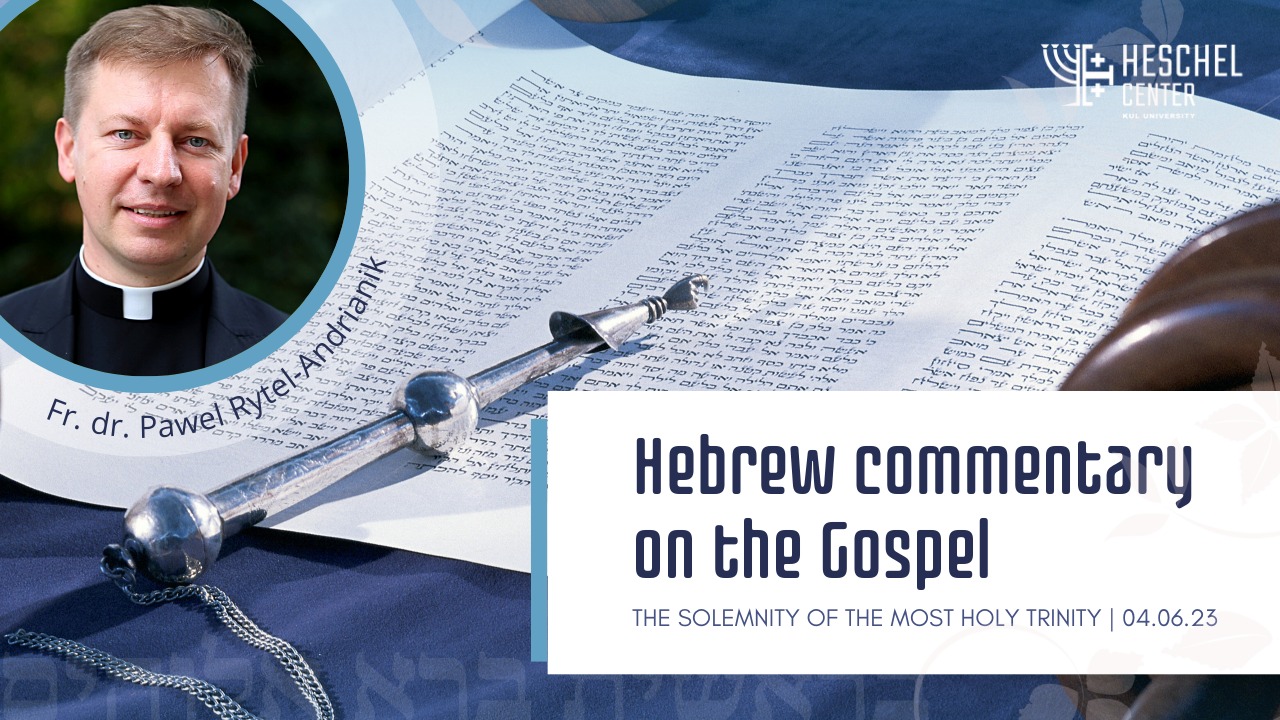Hebrew Commenary to the Gospel: Three Names of One God


Photo credit: KUL Heschel Center
„All Christians believe in the Holy Trinity. In Todays’s Gospel Jesus speaks to Nicodemus and reveals the mystery of the Holy Trinity. He reveals actually the three Names of God: Love, Savior, Giver of Life,” writes biblical scholar Fr. Paweł Rytel-Andrianik, deputy director of the Heschel Center of the John Paul II Catholic University of Lublin, in his commentary.
Full text
Nicodemus, a knowledgeable Pharisee who studied the Scriptures, approached Jesus at night to discuss his doubts. Who can be saved? He hears from Jesus that God is a loving Father, not a strict judge. “God so loved the world that he gave his only Son, so that everyone who believes in him might not perish but might have eternal life” (John 3:16) – Jesus says.
„God is love,” (1 John 4,8) we read in the letter of St. John the Apostle. And this is the shortest and most accurate description of God. God cares for people, he cares for every person in every part of the world.The Name of God is Love.
In today’s Gospel we read also: “God did not send his Son into the world to condemn the world, but that the world might be saved through him” (John 3:17). The name of Jesus is the Savior. Jesus, or Yeshua in Hebrew, comes from the Hebrew word „yasha,” which means to save. God sent Jesus to offer us salvation, which means being delivered from sin, finding reconciliation, and having God’s life within us.
Earlier in the Gospel Jesus tells Nicodemus „no one can enter the kingdom of God without being born of water and Spirit” (John 3:5). Spirit, or „Ruah” in Hebrew, is the breath that gives life. The Holy Spirit is the Giver of Life.
The Holy Trinity is, therefore, a mystery of love, salvation, and life. God is very practical: he is concerned with the good of every person.
About the author
Fr. Paweł Rytel-Andrianik is a doctor in Oriental Studies of the University of Oxford and doctor in Biblical Sciences and Archeology of Studium Biblicum Franciscanum in Jerusalem. Former Spokesman of the Polish Bishops’ Conference (2015-2020). Currently director of the Office of Foreign Communication of the Polish Episcopate as well as vice director of The Abraham J. Heschel Center for Catholic-Jewish Relations of The John Paul II Catholic University of Lublin.
The Pentateuch’s prophets and Moses predicted the outpouring of the Holy Spirit >>>
The end which is a new beginning – about an ever-present God >>>
Paraclete – three meanings of the Greek word hidden in the Old Testament >>>
The first covenant of God with the Jews is still valid >>>
Selective listening to Scripture – the mistake of the disciples at Emmaus >>>
God’s mercy inscribed on the pages of the Old Testament >>>
After his resurrection, why did Jesus first appear to women? >>>
Passover – the celebration of freedom and faith >>>
The more we know about Passover, the more we can understand the Last Supper >>>
Why did Jesus let Lazarus die? >>>
Who sinned, the blind man or his parents? >>>
How did the seventh man change the life of the Samaritan woman? >>>
Who was transfigured on Mount Tabor – the disciples or Jesus? >>>
The Desert – A Blessing or a Curse? >>>
KUL Heschel Center: Misunderstandings over the „eye for an eye” principle >>>
Law, Prophets, iota – we need to examine the context to understand the meaning of Jesus’ words >>>
Heschel Center KUL: What do salt, light and the city on a mountain mean to us? >>>
Heschel Center KUL: Why did the disciples, becoming „fishers of men,” abandon their nets? >>>
Hebrew Commentary to the Sunday Gospel excerpt – 2nd Sunday in Ordinary Time; Year A >>>
Jewish Commentary on the Gospel >>>
Hebrew commentary on the first Sunday of the New Year Gospel >>>
Jewish commentary on the Christmas Gospel >>>
Hebrew commentary on the Gospel for the Fourth Sunday of Advent >>>



Dodaj komentarz